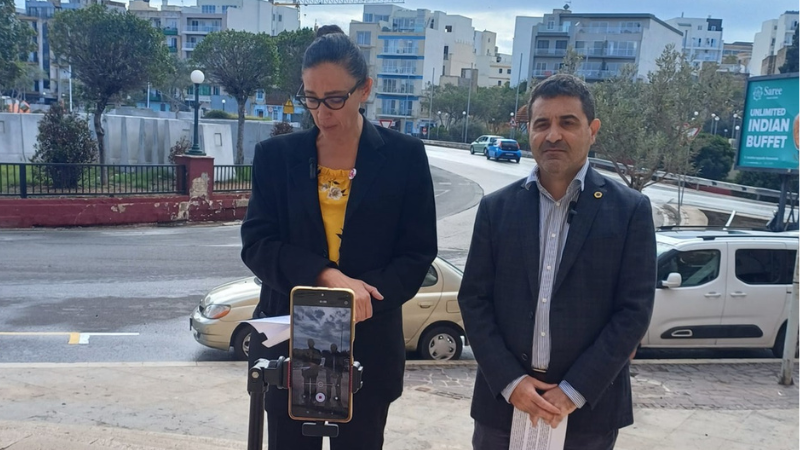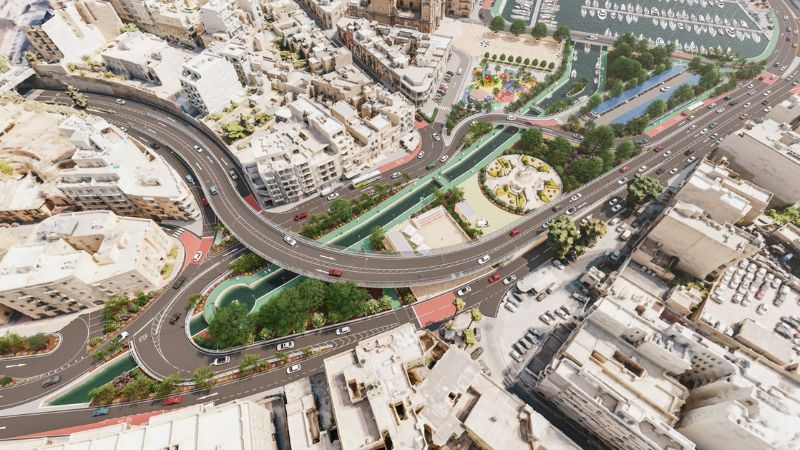The Green Party – ADPD again voiced objections to the Msida Creek project, saying it prioritised cars over people and their quality of life.
The Party said during a press conference in Msida that the increase in traffic was inevitable. Chair Sandra Gauci said that since the project’s proposal in 2019, people have opposed it “because it ignored the residents and open spaces.”
Despite some changes when it was presented in 2022, including “substantial amendments that included more public spaces, with a public square of around 2,200 square metres and also a canal, the fact remains that the project prioritises car use, ignoring other forms of transport, including walking,” Gauci added.
She pointed out that when the Chamber of Architects put forward its ideas for a solution, they were completely ignored because it was ‘too late.’ “We ask: ‘Too late’ for whom?”
ADPD referred to the 2025 Transport Masterplan and the 2050 strategy, saying that while including positive proposals, very few have materialised.
“The most important points being ignored are those concerning the need to provide alternative means of transport to reduce car use,” ADPD said.
“When you embark on a project of this nature and ignore your own masterplan, you are really showing that there is no plan to actually do what needs to be done, and such plans are being adopted to benefit the pocket of the few at the expense of the residents and the Treasury,” the Party added.
ADPD questioned why money was being wasted on studies only to be ignored. The Party insisted courage was required to take the bold decisions necessary.
Secretary General Ralph Cassar reinforced the fact that the government was ignoring its own studies, stressing it should be there to lead, not to be led by the few who want their personal interests prioritised over the common good.

Green Party Chairperson Sandra Gauci and Secretary General Ralph Cassar during a press conference at Msida on Saturday.
Excerpts from the Transport Masterplan 2025
“Within the organisational framework of Maltese road transport, one critical aspect that affects the road sector as well as other transport sectors is that transport policy and planning in Malta tend to be short-term in nature, with measures and projects primarily focusing on new road construction or increasing existing road capacity at problematic locations in isolation rather than considering the wider strategic policy context. (p.45)
- Lack of alternative forms of public transport to road-based buses
- Inadequate bus shelter provision and inflexibility of contract with bus shelter provider
- Poor quality pedestrian infrastructure reducing access to bus stops in urban areas
- Low level of bus priority provision to facilitate better reliability and punctuality of bus services (p.47)
- Traffic congestion will increase over time leading to reduced reliability and punctuality of bus services
- Lack of road space allocated to the safe and efficient operation of public transport
- Poor integration of the spatial planning of land use development with existing public transport provision encourages car dependency
- Decreasing usage of unscheduled public transport services by the Maltese travelling public
- Opposition to dedicated bus lanes by strong car lobby. (p.48)
Urban areas with high levels of public transport use often also have high levels of road traffic as well… Public transport services, even when augmented by paratransit services, would most likely not be able to provide the level of service that car users enjoy in many lower density or peripheral urban areas, but provision of high quality bus services along the main corridors to the busy centres and extensive provision within these centres can encourage modal transfer from private car to public transport at the periphery of the built up areas. (p.49)
Bus services share the roads with other traffic, they get caught up passing through areas of traffic congestion but, unlike other traffic, buses cannot take short-cuts to bypass congestion.
Most congested European cities provide clear priority for buses in traffic through the provision of bus priority measures (bus activated traffic signals, bus only streets, bus lanes, etc.) as buses use existing limited road space in a much more efficient manner than other traffic. (p.54)
There is great potential for the development of cycling as part of an integrated and intermodal transportation system (opportunity). This would entail improving bicycle infrastructure to and at public transportation hubs, improving both accessibility and the ability to securely park and/or store bicycles. Agreements must also be made with public transport operators enabling carrying or storage of bicycles in their vehicles. (p.59)”














The Transport Authority is run by a bunch of political lackeys, without any proper experience nor transport qualifications behind their name – their only quest, is to rid same of any person opposed to their political beliefs – the rest is irrelevant…..!